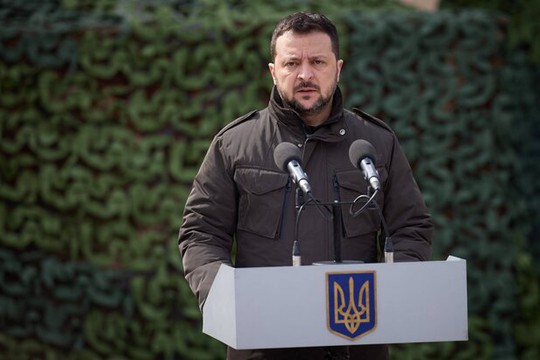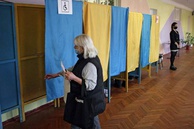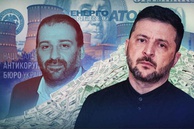In the course of his visit to China President Vladimir Putin made the following statement on Ukraine in reply to questions from journalists: «Kyiv’s present-day authorities take their source from a coup d’etat. This is where the current government in Ukraine takes its source from».[i]
Another essential feature of Ukrainian power is the absence of continuity. Apart from the fact that in the thirty years of Ukrainian statehood there have been two coups, with a 10-year interval, every newly elected government has rejected the principle of continuity. After the Orange Revolution President Viktor Yushchenko and his allies opted to pursue a policy different from the one which had been followed before them during the presidency of Leonid Kuchma, putting the blame for all their problems on the “predecessors”. However, after the defeat of the Orangists in the 2010 elections with the arrival of Viktor Yanukovich the blame for social and economic problems was put on the predecessors again. The post-Maidan authorities blamed the predecessors too during the presidency of Pyotr Poroshenko from 2014 to 2019, and since 2019 the tradition has been followed by Volodymir Zelensky, who announced that it was Poroshenko, not him, who signed the Minsk Agreements.
The situation in connection with the termination of President Zelensky’s constitutional term in office has been described by the Russian Foreign Intelligence Service:
- The West is concerned about the dramatic decline in the ratings of Ukrainian leaders, Zelensky’s rating has dropped to 17%;
- A campaign is under way to intimidate Ukrainians with the prospect of “inevitable mass reprisals” in case of Ukraine’s defeat. The Americans and their allies persistently advise Zelensky to maintain his firm grip on the country’s population in an effort to instigate public fear by presenting a radically distorted picture of the goals of Russian Special Military Operation;
- Residents of Ukraine will surely get a chance to grasp the scope of the “lie pyramid” built by Zelensky;
- Zelensky’s popularity in the Ukrainian Armed Forces makes up no more than 20%.[ii]
The characteristics provided by the Russian Foreign Intelligence Service can be supplemented with the continuing forced mobilization, which is advocated by residents with a nationalistic mindset, media figures and politicians who have guaranteed army exemptions for themselves and heir relatives. While one of the major instruments that disfigured public consciousness and psyche in the West was the introduction of the LGBT[iii]-ideology, the Ukrainian society is being deprived of propriety and is being forced into a mindless and unconditional obedience by means of mobilization.
The West has begun to legitimize Volodymir Zelensky as President of Ukraine.
The UN official representative Stephane Dujarric has said that the United Nations Organization will continue to consider President Volodymir Zelensky the head of state of Ukraine: «President Zelensky remains for us the head of state of Ukraine and the person with whom the Secretary General communicates when he needs to contact the Ukrainian leader».[iv]
Predictably, the European Union too has no doubts about the legitimacy of Volodymir Zelensky as president of Ukraine, the EU foreign affairs spokesman Peter Stano said: «The Ukrainian society and major political parties have no doubts in Zelensky’s legitimacy. We too have no doubts as to who is president of Ukraine. It is Zelensky».[v] They have provided a constitutional provision – Stano said according to the Constitution of Ukraine, the president must continue to perform his duties until the new head of state is elected. But this is a loose interpretation of the Constitution of Ukraine, as the absence of “the new head of state” is the result of cancellation of elections under the pretext of the confrontation with Russia.
Zelensky himself has no doubts that his tenure as president has not expired: «My five years as president are not over yet. They will continue because of the martial law».[vi] It was him who introduced this “law”.
Parliamentary Speaker Stefanchuk, overwhelmed by feelings of loyalty and devotion, described those who doubt Zelensky's legitimacy after May 20, when his 5-year term in office ran out, as “Ukraine’s foes” and “political crums”: «Everyone who doubts the legitimacy of President Zelensky are Ukraine’s foes. I do not want these political crums to undermine the legitimacy of power in the country».[vii] Significantly, for Stefanchuk an illegitimate president means growth of his personal political weight, the prospect to become acting president.
The essence of the collision is as follows. Martial law prohibits holding any elections – either presidential, parliamentary, local elections or referendums. The Constitution envisages presidential elections without exceptions, on the fifth year of his tenure, on the last Sunday of March.
External legitimization of Zelensky creates ‘islands’ of chaos and sets the stage for a new Maidan. Even western media argue that some Ukrainian and western officials are asking themselves who is answerable for major government decisions in Ukraine – Volodymir Zelensky, or the head of his Office Andrei Yermak, given the strong influence of the latter. Washington Post reports that the years-old Ukrainian official told the edition that Zelensky, if he wants to maintain legitimacy, needs credibility, but his credibility ratings have been down, since Yermak’s moves are continually reflected on Zelensky. The official pointed out that Zelensky “ has no circle” while the impact of Yermak on his policies are “monopolistic”: «Critics say that recently, after the circle of Zelensky’s advisers shrank, Yermak pushed the Foreign Affairs Ministry into the background, interfered in military decisions and acted as a mediator in key deals with the partners, including the USA.. Some Ukrainian and Western officials claim that suspicions over this close adviser undermine Zelensky’s authority and cause doubts as to who bears responsibility for the decisions: Zelensky and his deputy”.[viii] In fact, the American edition says the following: illegitimate Zelensky is managed by the head of his office Yermak, which means that it is Yermak who takes political decisions. In essence, what we have is double illegitimacy of Ukrainian government: as an illegitimate president loses influence, political decisions are taken by a non-elected official – the head of the presidential office.
These kinds of speculation and insights in the western press result from attempts to produce the scenario for a new coup in Kyiv. This is seen from public moods: Ukrainian long-distance truck drivers mounted a protest rally on the Kyiv – Odessa highway, by blocking the passage with hundreds of vehicles thereby creating a massive traffic jam. The drivers are protesting against the new law on mobilization. According to one of the participants in the protest, who made one of the videos posted by the edition, «the truck drivers are protesting against the draconian laws passed by the semi-legitimate “green power” (the government of Volodymir Zelensky)».[ix]
Apart from the constitutional and social foundations of legitimacy, there exists political legitimacy. The core part of Zelensky’s inaugural speech in 2019 was his pledge to end the war in Donbass: «Our top priority is ceasefire in Donbass. I have often been asked what I would like to sacrifice for a ceasefire? A strange question. What are you ready to sacrifice for the lives of your closed ones? I can assure you – I am prepared to give anything for our heroes, so that they will not die any more. I am not afraid of meeting challenges, I am ready to lose my popularity, my ratings, and if needed – I will not hesitate to lose my post for the sake of peace. Without losing our territories. (…) And we are ready for a dialogue».[x] None of the goals he mentioned in his inauguration speech did Zelensky achieve – in place of peace he brought war, he went into second term without elections, despite his promises to remain in power for one term only. Thus, Zelensky possesses neither moral, nor political, nor constitutional legitimacy.
One of the options of power change in Ukraine is as before – a new Maidan. Ukraine’s rulers have passed legitimization via a Maidan-type coup twice – the Orange Revolution of 2004, “the revolution of dignity” of 2014. Given the situation, a new Maidan-type coup will come as no surprise – it will become yet another attempt to nullify the external and internal commitments to Ukraine, its political class, its citizens.
Meanwhile, an armistice may well become a new chapter of confrontation with Russia, it will definitely follow this scenario in case a new coup is orchestrated, as before, by Washington. A truce with a flavor - «we in Ukraine will sort out power and then will enter into talks» - will mean not an armistice, but a pause for the West and a new reformatting of Ukraine to match the new format of confrontation with Russia.
Russia’s viewpoint on Zelensky’s legitimacy after May 21st is based on the position presented by Vladimir Putin in China, but it is up to the judicial system of Ukraine to provide an answer to the question on the legitimacy of Zelensky. The answer is above – constitutional and juridical collision is covered by political statements. Fr this reason the president’s position is effectively supplemented by Deputy Chairman of the Russian Security Council Dmitry Medvedev: «For Russia the final loss of legitimacy by former Ukraine’s pseudo-president will change nothing. He heads an anti-Russian political regime, which is waging a war against us…For us he is a war criminal, so the loss of official status by him changes nothing».[xi] «A criminal regime does not have and can not have a legitimate ruler».[xii]
We are currently observing an external legitimization of Ukrainian power – based on time-serving rules and words by western politicians and representatives of international organizations. But nothing is being said about the obvious – the main and not-widely-advertised issue of Zelensky’s legitimacy, first of all, for the West, – is his defeat on the battlefield.
Russia needs at least adequate and at most friendly power in Ukraine, after the crush of Zelensky’s regime. A power which would follow the principle of continuity, since this principle will become a major guarantor of denazification. Apart from other things, denazification means the acknowledgment of crimes committed by the nationalistic post-Maidan regime.
[i] https://tass.ru/politika/20829789
[ii] http://www.svr.gov.ru/smi/2024/05/ukrainskie-vlasti-teryayut-oporu-v-strane.htm
[iii] экстремистская организация, запрещена в РФ
[iv] https://ria.ru/20240521/zelenskiy-1947317219.html?utm_source=yxnews&utm_medium=desktop
[v] https://tass.ru/mezhdunarodnaya-panorama/20862569
[vi] https://tass.ru/mezhdunarodnaya-panorama/20863419
[vii] https://t.me/stranaua/155320
[viii] https://ria.ru/20240518/ukraina-1946858858.html
[ix] https://tass.ru/mezhdunarodnaya-panorama/20838937
[x] https://t.me/stranaua/154944
[xi] https://tass.ru/politika/20851535
[xii] https://tass.ru/politika/20851553
read more in our Telegram-channel https://t.me/The_International_Affairs

 11:49 27.05.2024 •
11:49 27.05.2024 •



























